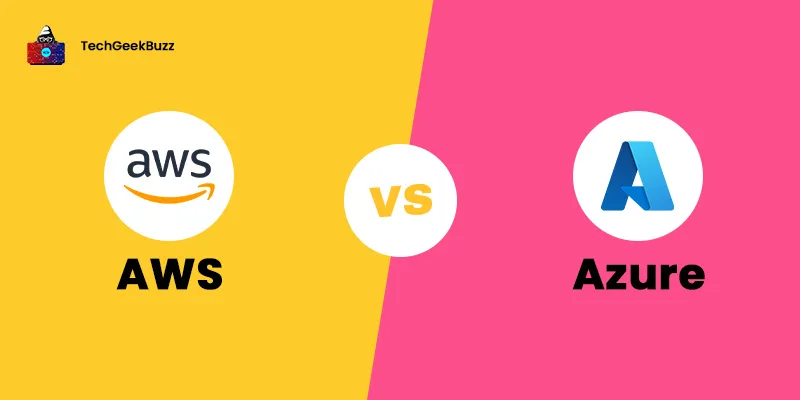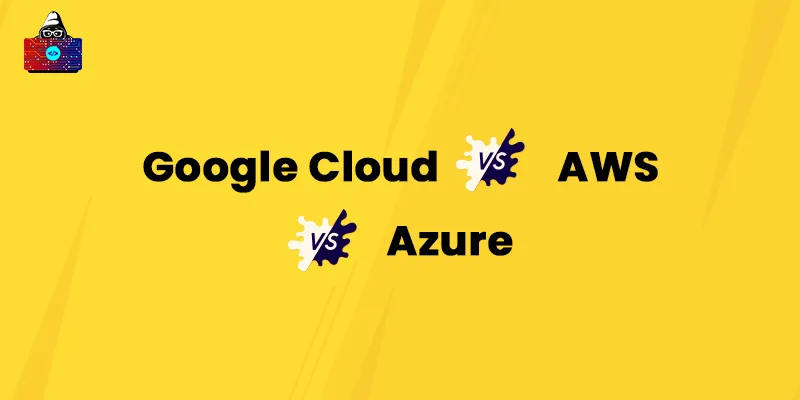Cloud computing has become a buzzword today. It is the on-demand delivery of computing services, such as servers, storage, databases, networking, virtual machines, and analytics. In simple terms, we can define cloud computing as the delivery of hosted services over the internet. Looking to compare AWS vs Azure best cloud service? This post will help you with this information. A cloud service provider is responsible for providing all the cloud computing services. AWS and Microsoft Azure are two leading cloud computing service providers. AWS or Amazon Web Services is a widely adopted cloud platform offered by Amazon, which offers more than 200 fully-featured services. On the flip side, Azure or Microsoft Azure is a cloud computing platform offered by Microsoft. The decision of choosing between AWS and Azure is difficult since both offer a wide range of fully-featured services on a pay-as-you-go basis. If you're having trouble making a choice between AWS and Azure and want to learn the differences between these, you've come to the right place. This article walks you through the major differences between AWS and Azure. Moreover, it will introduce you to AWS and Azure cloud platforms, along with their features, benefits, and drawbacks. So, let us get started!
What is AWS?
AWS (Amazon Web Services) is one of the most prominent and widely adopted cloud platforms. It offers more than 200 fully-featured services from data centers across the world. From start-ups to large enterprises and government agencies, they make use of various AWS cloud services to become more agile. This cloud computing platform includes three major offerings, namely Software-as-a-Service (SaaS), Infrastructure-as-a-Service (IaaS), Platform-as-a-Service (PaaS). Also, AWS provides more services than any other cloud platform. It offers a wide array of cloud services, ranging from infrastructure technologies, like storage, networking, compute, and databases, to emerging technologies, like machine learning , artificial intelligence, and the Internet of Things (IoT). AWS has an extensive global cloud infrastructure with almost 81 availability zones within 25 geographic regions across the globe. No other cloud provider offers such availability zones. One of the most desirable facets of AWS is that it charges on a pay-as-you-go basis, which means that you need to pay only for those services that you use.
History
AWS has stepped into the field of cloud computing back in 2002. The aim of AWS at that time was to sell its unused Infrastructure-as-a-Service (IaaS). Later, in 2004, AWS introduced and launched its first service, Simple Queue Service (SQS). The year 2006 witnessed the relaunch of AWS with two new services, namely S3 and EC2, along with the previous one, i.e., SQS. In the coming years, AWS started launching multiple services, such as VPC in 2009, Route 53 and SNS in 2010, and Elastic Beanstalk in 2011. In 2012, Amazon organized several big events with the goal of collecting feedback from customers on the existing services, announcing new services and products, and discussing new trends and technologies. Some popular events held by Amazon are AWS re: Invent, AWS Summits, AWS re: Inforce, AWS Innovate, and AWS re: Mars. Amazon, in the year 2013, started introducing various AWS certifications for candidates and professionals to gain expertise in AWS cloud. In 2014, it introduced Amazon Partner Network (APN). Later, Amazon launched Snowball and Snowmobile and surpassed the revenue target of $10 million in 2016. In 2018, Amazon introduced certifications in machine learning and artificial intelligence . By 2021, AWS included more than 200 fully-featured services.
Features of AWS
Here are the notable features of AWS:
- Scalable: AWS is scalable, meaning that it can scale the resources up and down whenever the demand for them increases or decreases, respectively.
- Elastic: Elasticity in AWS referred to as the distribution of incoming traffic across multiple targets, such as Lambda functions, EC2 instances, and containers. This feature of AWS ensures load balancing,
- AWS Services: AWS offers a broad spectrum of services, such as storage, database, computer, networking, security tools, development tools, management tools, and content delivery.
-
Encompasses 3 Pillars of Cloud Computing:
AWS employs three major cloud service models, namely IaaS, PaaS, and SaaS.
- Infrastructure-as-a-Service (IaaS): Infrastructure is the basic foundation of any cloud architecture. AWS provides Amazon Elastic Compute Cloud (EC2) as Infrastructure-as-a-Service (IaaS) through which you can build your website or analyze data.
- Software-as-a-Service (SaaS): SaaS lets users access web applications such as Amazon Simple Notification Service (SNS) and Amazon Simple Email Service (SES).
- Platform-as-a-Service (PaaS): Platform-as-a-Service provides a runtime environment for developing and testing applications without worrying about infrastructure. AWS Elastic Beanstalk is an example of PaaS.
- AWS Certifications: AWS provides a wide range of certifications and training courses that help learners to master AWS and validate their cloud expertise.
Advantages of AWS
Some significant upsides of AWS are as follows:
- AWS is an easy-to-use cloud platform, and even a beginner can operate it. Also, it enables users to access and modify their data anywhere and anytime.
- It offers excellent documentation and video tutorials that help you learn how to use AWS services.
- It is a cost-effective solution; you need to pay only for those services that you use.
- AWS is a flexible cloud platform since it lets you choose the programming language, operating system, and web application platform of your choice.
- Security being the utmost priority of data-driven organizations, AWS provides a highly secure and reliable infrastructure.
- AWS has the ability to process colossal amounts of data at a high speed in less time.
Disadvantages of AWS
The following are the downsides of AWS:
- There are default limits on resources such as images, snapshots, and volumes of datasets, which vary from region to region.
- AWS does not provide free technical support. You need to subscribe to one of its three packages, namely Developer, Business, and Enterprise.
-
By keeping security as the most significant aspect, AWS imposes some limitations on AWS EC2. These restrictions are as follows:
- EC2 Classic: It supports a maximum of 500 security groups per instance with each group having 100 permissions.
- EC2 VPC (Virtual Private Cloud): It supports up to 100 security groups per VPC.
When to Choose AWS?
If an organization needs a powerful Infrastructure-as-a-Service (IaaS) provider and a wide range of development tools, choosing AWS would be a great move.
What is Azure?
Azure, also known as Microsoft Azure, is another widely adopted cloud computing platform. It offers more than 200 products and cloud services that help businesses carry out their operations smoothly. With tools provided by Azure, you can develop, run, and manage applications across multiple clouds and on-premises. Like AWS, Microsoft Azure also provides various cloud services that follow three models, namely Software-as-a-Service (SaaS), Infrastructure-as-a-Service (IaaS), and Platform-as-a-Service (PaaS). In addition, Azure supports various programming languages and Microsoft-specific and third-party software and system, frameworks, and tools. Azure provides various cloud services, such as compute, networking, storage, migration, analytics, artificial intelligence, the Internet of Things (IoT), and many others. Currently, Azure has 54 availability zones. These availability zones are physically and logically separated data centers with their own power source, network, and cooling systems. Like AWS, Microsoft Azure charges on the basis of the pay-as-you-go. It also provides multiple services for free for the first 12 months.
History
During the Microsoft Professional Developers Conference in 2008, Microsoft’s chief software architect, Ray Ozzie, announced that they have planned to launch a cloud platform called Windows Azure. Further, he told in the conference that Windows Azure would offer five categories of cloud services, which are as follows:
- Windows Azure for compute, storage, and networking.
- Microsoft SQL Services for databases.
- Microsoft .NET Services for developers.
- Live Services for file sharing.
- Microsoft SharePoint Services and Microsoft Dynamics CRM Services SaaS offerings.
In 2010, Microsoft made Windows Azure commercially available. Since it was a newer cloud platform than AWS, it got mixed reviews. Over time, Microsoft improved Azure. It added support for an array of programming languages, operating systems, tools, and frameworks. Later, in 2014, Microsoft renamed Windows Azure to Azure, which represented that it is a cloud computing service beyond the Windows system. In the following years, it has launched many cloud services, and as of now, it is a comprehensive cloud platform with nearly 200 fully-featured services.
Features of Azure
The following are some remarkable features of Azure:
- Scalability: Like AWS, Microsoft Azure is also a scalable cloud platform. It can scale the resources up or down depending upon the change in the demand.
- Hybrid Cloud: In general, a hybrid cloud is an environment consisting of one or more public and private clouds. Azure hybrid cloud enables users to run apps on-premises, migrate applications to a public cloud, and enable DevOps workflow.
- Strong Support in Analytics: Azure comes with built-in support for data analysis and extracting actionable insights.
Advantages of Azure
The following are the key advantages of Azure:
- Microsoft Azure primarily focuses on data security. It follows the standard security model, ADADSC (Detect, Assess, Diagnose, Stabilize, and Close). Also, it has many compliance certifications and protects both the platform and end-users.
- It offers high availability and redundancy in data centers on a global scale. Due to this Azure offers the service level agreement (SLA), i.e., commitments for uptime and connectivity for individual Azure services of up to 99.95%.
- It is a cost-effective solution since it charges you on a pay-as-you-go basis. In addition, it provides some services, such as Azure Virtual Machines, Azure Blob Storage, Azure Load Balancer, Azure SQL Database, and many others, free of cost for the first 12 months.
- Azure enables you to work with any programming language, tool, and framework of your choice.
Disadvantages of Azure
Some major drawbacks of Azure are as follows:
- Although Azure lets you save a lot on purchasing hardware and maintaining infrastructure locally, you need to hire someone who is an expert in handling Azure and managing server monitoring and patching.
- Since Azure has its data centers in 54 availability zones within 140 countries, it does not offer the same performance in all countries. The speed of data access depends on your location.
When to Choose Azure?
Choosing Azure would be a great choice when you need a Platform-as-a-Service (PaaS) provider and seamless Windows integration.
AWS vs Azure: Head-to-Head Comparison
Let us compare AWS and Azure based on their features and services.
AWS vs Azure - Common Features
The following table highlights the key differences between the features of AWS and Azure:
| Parameters | AWS | Azure |
| Launched By | Amazon | Microsoft |
| Availability Zones | It has 81 availability zones in 25 geographic regions worldwide. | It has 54 availability zones in 140 countries. |
| Market Share | AWS has a market share of 40% in the cloud market. | Azure has a market share of 30% in the cloud market. |
| Hybrid Cloud | In terms of hybrid cloud, AWS is still in progress. | Azure excels in the hybrid cloud. |
| Linux | AWS provides extensive support for Linux. | The support for Linux is still in progress. |
| Pricing | AWS charges on an hourly basis for the services you use. | Azure charges on a minute basis for the services you use. |
| Mature Environment | This cloud platform provides a more mature environment for big data than Azure. | This cloud platform is less mature for big data. |
| Type of Network | AWS offers Virtual Private Cloud (VPC). | Azure offers Virtual Network (VNET). |
| Government Cloud Offerings | AWS has an edge over Azure in terms of government cloud offerings since it provides high-level security measures and better control. | Azure has a limited scope when it comes to government cloud offerings. |
| Users | Some prominent companies that use AWS are Netflix, Twitter, Samsung, Airbnb, and BMW. | Some giant companies that use Azure are Apple, HP, Johnson Controls, and Honeywell. |
AWS vs Azure - Services
Both AWS and Azure cloud platforms offer an array of services that fall under compute, database, storage, and networking categories. The following table draws a detailed comparison between the services offered by AWS and Azure:
| Services | AWS | Azure |
| Compute: It is a generic term used to refer to processing power, database, storage, networking, and other resources required for the computational success of any software program. | Some popular compute services of AWS are EC2, Elastic Beanstalk, AWS Lambda, ECS, etc. | Typical compute services offered by Azure include Azure Virtual Machine, Virtual Machine Scale Sets, App Service Scale Capability, Azure Functions, and Container Registry. |
| Database: A cloud database is a database that runs on a cloud-computing platform. Access to this database is provided as a service. | AWS has Amazon Relational Database Service (RDS). It supports various popular database engines, such as Amazon Aurora, MariaDB, Microsoft SQL, PostgreSQL, Oracle, and MySQL. | Azure has Azure SQL Server Database that is based on MS SQL Server. |
| Storage: This service stores and maintains customers’ data, and makes it available over a network. | AWS has storage services, such as AWS S3, EBS, and Glacier. | Azure has Blob Storage, Disk Storage, and Standard Archive, as storage services. |
| Networking: The networking service refers to creating isolated networks within the cloud. | This cloud platform offers Virtual Private Cloud (VPC) for creating isolated networks within the cloud. | This cloud platform provides Virtual Network (VNET) to create isolated networks. |
AWS vs Azure: Which One to Choose?
Now that we have discussed the features, advantages, and disadvantages of AWS and Azure along with the differences between the two, it is time to choose one that best fits your organization’s requirements. From the above discussion, we can conclude that there is no clear winner. Both AWS and Azure cloud platforms provide services in various domains, such as compute, storage, networking, and database. In terms of handling big data, AWS outperforms Azure. On the other hand, Azure outperforms AWS in terms of hybrid cloud. If you are looking for a good infrastructure-as-a-service (IaaS) provider, AWS is an excellent choice. On the flip side, Azure is a better choice when you need a good Platform-as-a-Service (PaaS) provider.
Conclusion
This article tried to shed light on the key differences between two leading cloud platforms - AWS and Azure. Both cloud services providers are available in various regions across the globe and offer a wide range of services on a pay-as-you-go basis. Therefore, the ultimate choice between the two entirely depends on your requirements.
Frequently Asked Questions
1. Are AWS and Azure the same?
AWS and Azure are cloud service providers that offer a wide range of cloud computing services. However, Azure outperforms AWS when it comes to hybrid cloud and integration with Microsoft products. On the contrary, AWS outperforms Azure when it comes to offering more diverse tools and services.
2. What does Netflix use - AWS or Azure?
Netflix uses AWS for all its computing and storage needs, including databases, recommendation engines, analytics, video transcoding, and many more that in total use more than 100,000 server instances on AWS.
3. Which is more popular - AWS or Azure?
Amazon launched AWS in 2006, whereas Microsoft launched Azure in 2010. Since AWS is an early bird, it is more popular than Azure.
People are also reading:





Leave a Comment on this Post